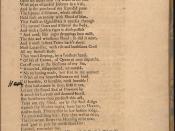In close reading of the first soliloquy made by Hamlet in Shakespeare's "The Tragedy of Hamlet", Prince of Denmark, we see that Hamlet is a very hurt young man, overcome with feelings of futility and despair. Hamlet's speech is given after losing his father and having his mother remarry hastily soon after, seemingly with no regret for her son or late husband. In his soliloquy, Hamlet gives a passionate account of his true feelings which strikingly contrast his outer, artificial speech towards his mother and stepfather. Through this soliloquy, Hamlet expresses profound melancholy and the reasons for his despair.
Hamlet's emotions toward the world displayed in this soliloquy are those of futility, disgust, angst, and deep sorrow. His discourse opens with a poignant statement of his desires to die: Hamlet wishes his "too too solid flesh would melt" and that suicide was not a mortal sin. Hamlet states "How weary, stale, flat and unprofitable, /Seem to me all the uses of this world!" In this statement, he asserts his view of life as being futile.
In his next concept, he uses the words "rank" and "gross" in the context of a simile comparing life to an "unweeded garden", evidently showing his utter repulsion by all that inhabits the "garden", his world. Hamlet's angst is displayed in an overtone of anxiety throughout the whole soliloquy, yet a direct example of his worry is shown in his non-acceptance of the short period of time between his father's funeral and his mother's "incestuous" marriage. More than thrice, Hamlet criticizes the time frame between the two events, realizing it shorter each time. It is almost as if he is in disbelief of these affairs, and he will never accept them as being existent. The last of the main characteristics that Hamlet exhibits...


